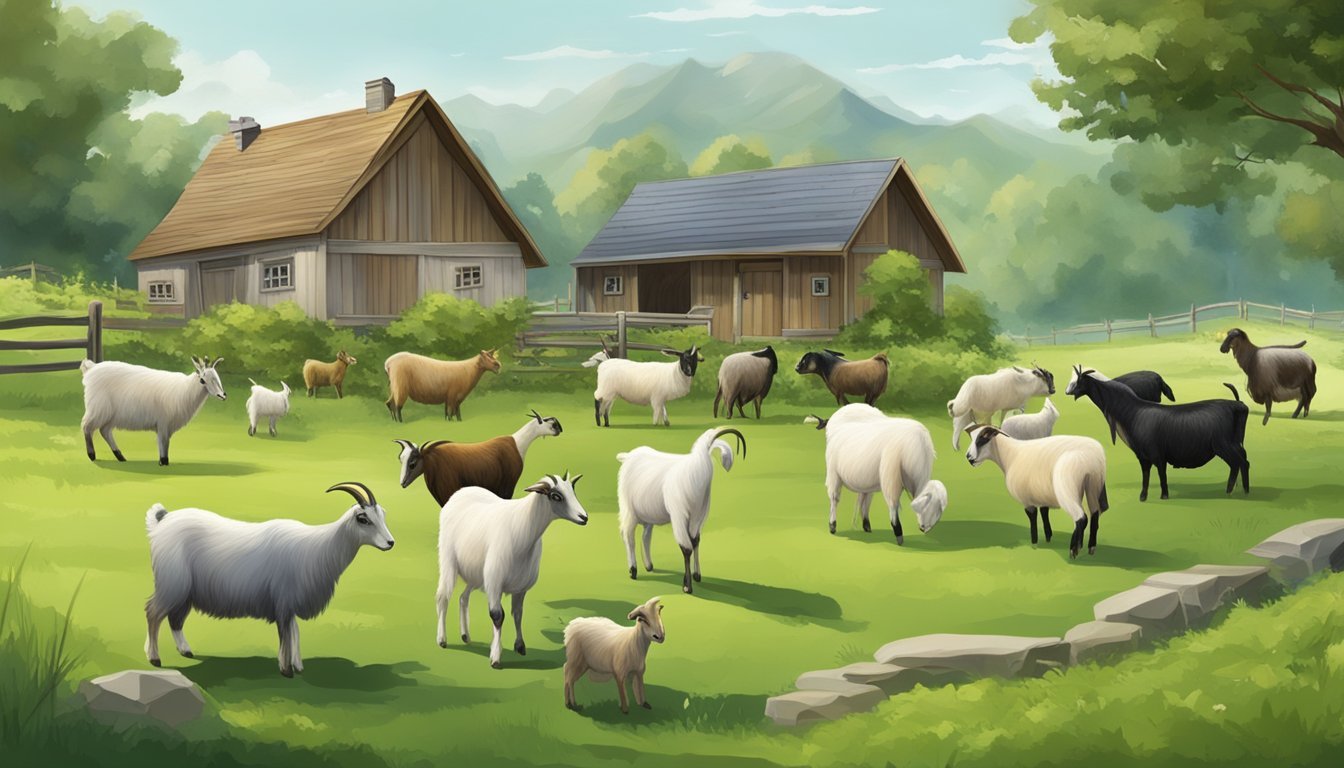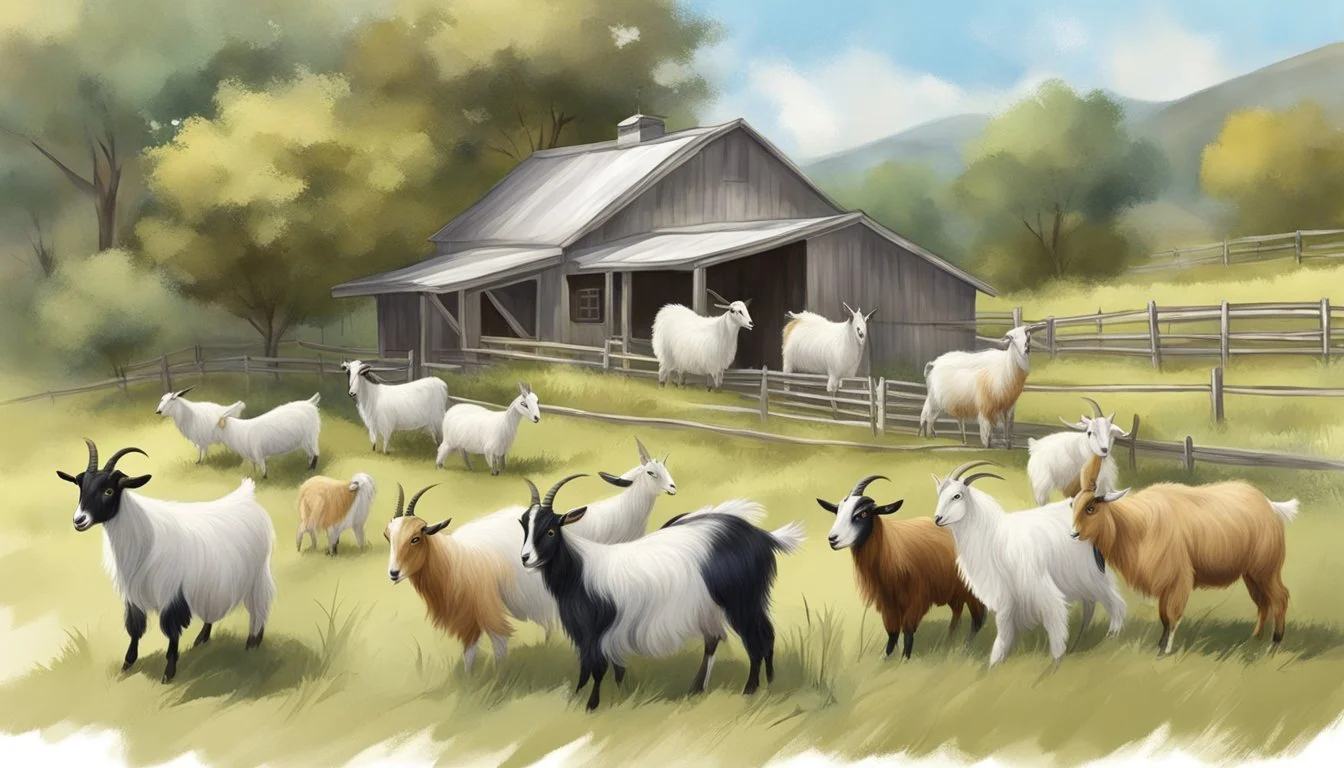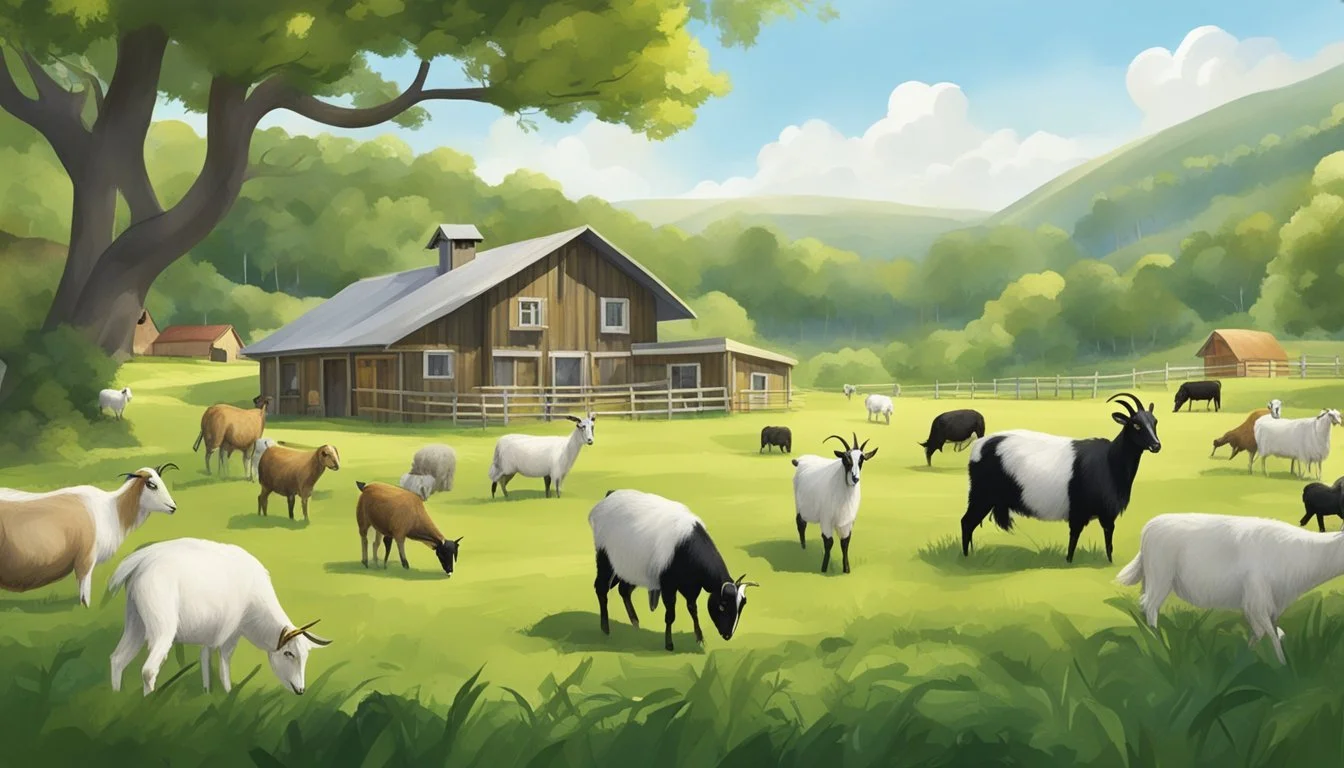What Are the Best Goat Breeds for a Small Homestead?
Criteria for Selecting Your Ideal Livestock
Determining the best goat breeds for a small homestead hinges on a balance of space limitations, production needs, and personal preference. For those with limited acreage, smaller breeds like the Nigerian Dwarf offer a practical solution. They not only require less space but also provide a generous quantity of high butterfat milk, which is ideal for cheese making. This breed's amiable nature and manageability due to their size make them a top choice for small-scale homesteaders.
On the other hand, homesteaders looking for a dual-purpose breed may lean towards larger goats that provide both milk and meat. Among these, the Mini Nubian, a cross between a standard Nubian Doe and a Nigerian Dwarf Buck, stands out. They blend the butterfat-rich milk production of their Nigerian Dwarf heritage with the larger size and sturdy build of their Nubian lineage. Mini Nubians are also celebrated for their adaptability and sociable disposition, making them well-suited for small farms seeking a balance between productivity and ease of handling.
Choosing the Right Goat Breeds for Your Homestead
Selecting the best goat breeds for a homestead depends on clearly defined goals and the practical assessment of available resources. Here's how to approach it:
Determining Your Goals
Before deciding on goat breeds, one must identify their primary purpose on the homestead. Milk production, meat provision, and even land clearing are common objectives. For those aiming to produce both milk and meat, dual-purpose goat breeds like the Nubian, Nigerian Dwarf, or Oberhasli might be ideal. In contrast, the Saanen breed excels in dairy production, offering a high yield of low-fat milk.
Assessing Space and Resource Availability
A homestead's space constraints will influence the size and number of goats it can support. Smaller breeds such as the Nigerian Dwarf or Pygmy are well-suited for more limited areas and can still contribute significantly to milk production or as pets. For larger plots, one might consider breeds with higher grazing needs. It is important to also account for shelter, fencing, and pasture management when choosing the appropriate breeds for your homestead.
Best Goat Breeds for Milk Production
When considering goat breeds for milk production on a small homestead, key characteristics to factor in are the quantity of milk produced, butterfat content, and the breed's adaptability to the environment. Here are some of the best dairy goat breeds renowned for their milk production capabilities.
Nigerian Dwarf
The Nigerian Dwarf goat offers rich milk with a high butterfat content, making it ideal for homemade dairy products like cheese and yogurt. Despite their small stature, they are proficient milk producers, often yielding up to 2 quarts per day.
Alpine
Alpine goats are known for their hardiness and consistent milk production. They can produce between 1 to 2 gallons of milk daily with an average butterfat content of around 3.5%. This breed is highly favored for both homestead dairy production and commercial dairies.
Nubian
The Nubian breed is distinguished by its long, floppy ears and notable vocalizations. Nubians have a higher butterfat content in their milk, averaging around 4-5%, which is preferable for rich and creamy dairy products.
LaMancha
The LaMancha goat, easily recognized by its very short ear pinnae, is an American breed that excels in the production of high-quality goat milk. It produces milk with a butterfat content around 4%, balancing both volume and creaminess.
Saanen
The Saanen goat is often lauded as a top dairy producer, generally yielding large quantities of milk with about 2-3% butterfat content. This Swiss breed is considered one of the best for those looking to maximize milk production on their homestead.
Best Goat Breeds for Meat Production
Choosing the right breed for meat production on a small homestead is crucial, as some goats are specifically bred for their meat qualities, resulting in better yields and more efficient farming. These breeds are known for their fast growth rate and high-quality chevon.
Boer
Boer goats are one of the most popular choices for meat production due to their rapid growth and excellent carcass qualities. Originating in South Africa, these goats have a high meat-to-bone ratio and are renowned for the tender and flavorful meat they produce. Homesteaders favor Boers because they can adapt well to a variety of climates and feeding regimens.
Kiko
The Kiko breed, hailing from New Zealand, is another top pick for meat producers. Kiko goats are celebrated for their hardiness and the ability to thrive on minimal management, making them ideal for those looking for low-maintenance livestock. Their exceptional survival instincts often translate to lower veterinary costs and less hands-on care.
Spanish
Spanish goats, also referred to as brush goats or scrub goats, were originally brought to the Americas by Spanish explorers. These goats are highly valued in the meat production industry for their lean meat and adaptability to tough environmental conditions. Spanish goats often have strong foraging skills, which makes them particularly useful for clearing and managing overgrown pastures.
Myotonic (Tennessee Fainting Goat)
Lastly, the Myotonic, or Tennessee Fainting Goat, is another breed that is suitable for meat production, particularly on small homesteads. These goats are characterized by their unique muscle stiffness which causes them to temporarily "faint" when startled. Despite this, Myotonic goats are well-muscled and have a high meat-to-bone ratio, making them an excellent choice for producing chevon.
Dual-Purpose Breeds
Dual-purpose goat breeds are valued for their ability to efficiently provide both milk and meat. Choosing the right breed for your homestead will depend on factors such as climate resilience and nutritional needs.
Oberhasli
The Oberhasli breed, known for its distinctive chamois coloration, is a medium-sized goat that originated in Switzerland. They produce a moderate amount of high-quality milk which is rich in nutrition, making them a suitable choice for small-scale homesteaders looking to diversify their production.
Toggenburg
Toggenburg goats, one of the oldest known dairy goat breeds, hail from the Toggenburg valley in Switzerland. These hearty animals have a good milk yield and can adapt to various climates. Their milk is also noted for its consistency in both production and quality, securing their place as some of the best dual-purpose goats for homesteaders.
Kinder
The Kinder goat is a crossbreed, designed specifically for small homesteads. They are the result of crossing a Pygmy, a meat breed, with a Nubian, a dairy breed. This unique combination yields a compact and efficient goat, excellent for both meat and milk production, making them a practical choice for those with limited space.
Fiber and Brush-Clearing Goats
For small homesteads, certain goat breeds excel not only in providing valuable fiber for yarn and soap making but also in clearing brush. They offer a dual-purpose benefit, managing vegetative growth and contributing to fiber production.
Angora
The Angora goat produces a luxurious fiber called mohair, highly prized for its silkiness and warmth. These goats require regular shearing but provide homesteaders with a continuous supply of material for high-quality yarn.
Cashmere
Cashmere goats contribute with an exceptionally soft and sought-after fiber. While all goats technically produce cashmere, specifically bred Cashmere goats yield a higher volume and quality of this fine fiber, which is harvested during the spring molting season.
Pygora
A Pygora goat is a cross between a Pygmy and an Angora, producing three distinct types of fiber: type A (mohair-like), type B (blend), and type C (cashmere-like). These goats offer versatility for fiber goat breeds, allowing for a range of textures for various fiber projects.
Spanish Meat Goats
While not typically known for fiber production, Spanish meat goats are robust and adept at clearing brush, making them a practical option for maintaining a homestead. Their hardiness and foraging ability help to efficiently manage overgrown areas.
Miniature and Pygmy Goat Breeds
Miniature goats and Pygmy goats are ideal for small homesteads due to their smaller size and less space requirements. They are also easier to handle, making them excellent choices for pets and companionship.
Nigerian Dwarf Goats
Nigerian Dwarf Goats are a highly popular miniature breed known for their dairy production. Despite their petite stature, they have the capacity to produce a substantial amount of milk with a high butterfat content. On average, does stand at about 17 to 21 inches, while bucks can reach up to 23 inches. Their gentle and friendly demeanor adds to their appeal as farmyard companions. The manageable size of Nigerian Dwarf Goats and their good-natured personalities make them an excellent addition to smaller farms where space might be limited. They require proper shelter, nutrition, and companionship, similar to larger goat breeds, but their smaller size can be advantageous for those new to goat keeping.
Pygmy Goats
Pygmy Goats are another breed well-suited for small-scale farming and are often chosen for their amiable nature and adaptability. Originating from West Africa, these sturdy goats typically weigh around 53 to 86 pounds, making them more compact than other breeds. With an average height ranging from 16 to 23 inches, they are slightly stockier than Nigerian Dwarf Goats. Pygmy goats are not only kept for their playful and affectionate characteristics but are also valued for their meat. Their hardy constitution and minimal space requirements make Pygmy goats an excellent option for homesteaders looking to raise goats for meat or simply as pets. Their ease of care and the joy they bring to daily farm life are why many small homesteads prefer Pygmy goats.
Management and Care for Homestead Goats
Proper management and care are vital for maintaining a healthy and productive homestead goat herd. These animals require suitable living conditions, proper diet, regular health checks, and secure fencing to thrive.
Shelter and Comfort
Goats need a dry, draft-free shelter to protect them from the elements. A simple three-sided structure can suffice for small herds, with bedding such as straw to provide additional comfort and warmth. Adequate space is crucial to prevent overcrowding—each goat requires about 15 to 20 square feet of indoor space.
Feeding and Nutrition
A balanced diet is essential for goats, which includes access to fresh water, hay, and nutrient-rich feed. They should have ample pasture for grazing to meet their dietary needs. Providing a hay rack can help keep their food clean and dry. Goats also require minerals, so a mineral feeder accessible at all times is necessary for their well-being.
Health and Veterinary Care
Regular veterinary care is required for vaccinations, deworming, and treating any illnesses. Homesteaders should have a basic knowledge of goat health issues and be observant of their herd's behavior for early detection of health problems. Scheduling routine check-ups with a vet who is experienced with livestock is recommended.
Fencing and Security
Fencing is critical to keep goats safe from predators and to prevent them from straying. Sturdy, goat-proof fencing should be at least 4 feet high to prevent jumping and secure enough to block gaps and holes through which they might squeeze. Regular inspection and maintenance of fences will ensure the ongoing security of the goat herd.
Building a Sustainable Goat Herd
When establishing a goat herd on a small homestead, choosing the right breeds and focusing on optimal breeding practices are crucial for sustainability. The goal is to maintain a herd that thrives in its environment, possesses strong genetics, and provides long-term productivity.
Breeding and Genetics
The genetic makeup of the goats in a homestead's herd is foundational to their overall health, adaptability, and productivity. Focused breeding involves selecting both does and bucks with desirable traits that will be passed down to the offspring. One strategy homesteaders often employ is to maintain a herd of registered goats, as they come with documented lineage and traceable genetic traits. This ensures consistency and can improve the herd's quality over generations.
In terms of adaptability, choosing a goat breed or breeds that can thrive in the specific conditions of the homestead is important. For example, homesteaders in colder climates might favor breeds such as the hardy Saanens, known for their robust milk production and ability to withstand harsher conditions. Information on the adaptability and traits of Saanens can be found through The Happy Chicken Coop's guide.
Long-Term Productivity
For homesteads, productive animals are those that can consistently yield valuable resources, be it milk, meat, or fiber. Long-term productivity hinges on more than just the initial yield; it encompasses the health and longevity of the goats. A well-thought-out breeding schedule is part of this, as it ensures does are not overbred and that the timing of births allows for maximum care and resource allocation.
Best goat breeds for long-term productivity on a small homestead often include dual-purpose breeds, such as the Pygmy, which have value both for meat and milk, as noted in resources like Homestead Survival Site.
By concentrating on strong genetics and sustainable breeding practices, alongside choosing the right goat breeds, a homestead can build a resilient and productive goat herd.
Supplementary Goat Uses and Activities
In addition to their primary roles for milk and meat, goats can contribute to a small homestead in various other ways. This section examines a few supplementary uses and activities that leverage the versatility of goats, enhancing both the functionality and potential income of a backyard farm.
Pack Goats
Pack goats are an excellent resource for homesteaders who explore rugged terrains or need assistance carrying supplies. These versatile animals have a calm demeanor and can navigate challenging paths, making them ideal companions for hiking and camping trips. Training pack goats takes patience, but their strength and cooperative nature reward diligent trainers by carrying essential gear.
Dairy Product Processing
Beyond fresh milk, dairy product processing is a valuable skill for homesteaders. With goats on a small homestead, one can produce a variety of dairy products such as cheese, yogurt, and kefir. Dairy goats, particularly dual-purpose breeds, provide milk that can be transformed into artisanal goods. Learning to make dairy products can not only cater to a family's needs but also introduce unique items into local markets.
Homesteading Income Streams
Goats can generate multiple income streams for a homestead. Besides selling milk and meat, homesteaders can market goats as pets for their docile nature and capacity for love and companionship. Moreover, there's a market for breeding stock, particularly for high-quality or rare breeds. Homesteaders might also consider offering agri-tourism experiences, where visitors can engage in farm activities, such as goat milking workshops or goat yoga sessions, adding a creative dimension to homesteading income.






